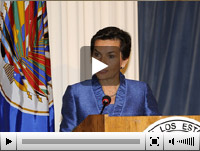- English
Lecture Series
Forty Fifth Lecture - Christiana Figueres
Forty Fifth Lecture - May 13, 2011
"Climate Change: What Americas Can and Must Do"
Speaker: Christiana Figueres, Executive Secretary of the United Nations
Framework Convention on Climate Change (UNFCCC)
It is an honor to be invited to address you today in the tradition of
distinguished personalities of the political and economic spheres. Generally,
this Lecture Series focuses on the areas of democracy, social development,
human rights, and multidimensional security.
Without exaggeration, this range of topics reflects the lethal nature of
climate change, since it is a threat to each and every one of them. Within a
single lifetime, climate change will shake developing countries unevenly,
especially those with fragile governments, migration problems and rapid urban
growth.
Climate change will hinder the achievement of the Millennium Development Goals
and will begin to erode its progress, directly affecting the advance of
development. It will trigger changes in agricultural patterns and increase
water stress in many regions which are already arid. In fact, climate change
has been recognized by the Department of Defense of the United States as a
security threat. Moreover, climate change will change what we understand by
human rights today.
The Americas are represented from side to side in the Organization of American
States. And also from one side to another, the continent faces the full range
of impacts and vulnerabilities of climate change, although of course each
country individually has its own challenges in adapting.
According to recent research, climate change vulnerability in the Caribbean,
Central America and some countries in South America is "high" and will no
doubt be "severe and intense" by 2030, while the vulnerability of the North
American economy to the impact of climate change will be high and the habitat
loss, intense.
But each of the countries of the continent has a number of key opportunities
to address climate change by promoting sustainable development both from the
perspective of adaptation and from the perspective of mitigation. It is
important to take full advantage of these opportunities. And currently there
is no better way to take advantage of them than by implementing the Cancun
Accords.
These Accords were reached under the outstanding leadership of Chancellor
Patricia Espinosa of Mexico last December. The agreements, which enjoy nearly
universal support are a huge step for the community of nations, but
unfortunately, a small step for the planet.
Full Speech (English)
Full
speech (Spanish)


